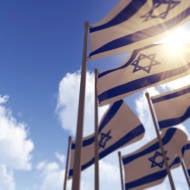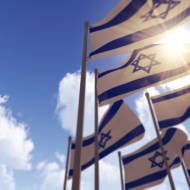
Fighting for Independence: How One Woman Survived Syrian Captivity

‘One of the men sitting beside me had a grenade and was about to pull the pin, but I stopped him and said, ‘We must live to tell the story.”
By United with Israel staff
Among the many Jewish men and women who fought to establish the Jewish state was Simcha Sima Zeiman.
During Israel’s War of Independence, she helped defend against the Syrian invasion, but was captured and held captive in Damascus for over year.
She recalled her experiences in a column published by ynet, noting that, at age 14, she enlisted in the Irgun, one of the groups of Jewish fighters who helped expel the British and later fought in the War of Independence.
“During that time, the country was under the rule of the Mandate and many of my friends, who were older than me, took an active part in the resistance to expel the British from the country.”
“I reached out to one of the activists and was given a specific rendezvous. To make sure he would recognize me, I wore a red shirt and held a newspaper in my hand as I walked along the sidewalk where we agreed to meet. Eventually, he appeared and asked me my age.
“Knowing they didn’t accept girls my age, I lied and said I was 16. He said he would call me back. Our house was one of the few that had a telephone, as I grew up in a very affluent home.
“My parents were Emily and Moshe Meyuhas, and my father worked as a salesman for an international radio company. Interestingly, I am the 17th generation of my family in Jerusalem and the eldest among my four siblings.
“After waiting for several months, I finally received the expected phone call inviting me to a meeting in Tel Aviv. At the time, I was already a high school student at Evelina de Rothschild, and I sneaked out of the house, pretending I was headed to school without informing my parents.
“The guy who called me took me to an old synagogue, where a man behind a black curtain swore me to secrecy and spoke about important work being done for the nation. I was filled with excitement and joy, feeling like I was joining an important clique.
“After coming back to Jerusalem, I kept my secret hidden from everyone. Every week, I would make my way down to the lowlands to train on various weapons, such as a stun gun, a Parabellum, grenades, a rifle, and a Lewis gun.
“I started off by just hanging posters in the streets, unlike the graduates who took more direct action. However, once the British left the country on May 14, 1948, the conflict with the Arabs escalated, and I found myself actively participating in battles in Jaffa, using weapons and constantly putting my life on the line.
“As soon as we were notified that they were looking for volunteers to travel to Mishmar HaYarden in Upper Galilee as reinforcements against Syrian offensives, I didn’t hesitate to offer my services as a combatant.
“Although I had already completed my high school exams and was an active member of the resistance, my parents were still completely oblivious to the fact. I was accompanied by twelve boys and four girls from the Haganah, all of whom were Tel Avivis and two years my senior.
“Our journey to Mishmar HaYarden was intercepted by defense forces who ordered us off the bus and provided us with accommodation for the night on a kibbutz before returning us to Tel Aviv the following day.
“However, we were not deterred. After a week, we arranged for a private bus, were given weapons, and this time, we managed to reach our destination. Along with us were combatants from the neighboring kibbutzim and moshavim, as well as new immigrants who were Holocaust survivors.
“We trained with weapons, stood guard, and took turns in positions around the settlement to warn of an anticipated Syrian invasion.
“During this two-week period, the Syrians launched three attacks on the colony. The first two occurred on June 5 and 6, 1948, which we successfully fended off by stopping them from crossing the Bnot Ya’akov Bridge that separated us from them.
“However, our ammunition was almost depleted. Despite our hopes for additional ammunition, it never arrived, most likely due to the limited supply that had to be distributed across multiple fronts.
“In anticipation of a potential Syrian invasion, women, children, and the elderly were evacuated to Rosh Pina. Four of the volunteers – two girls and two guys – decided to abandon the mission and attempted to convince me to join them, but I refused, remaining steadfast in my commitment.
“During the third offensive on June 10, 1948, the Syrian army invaded the settlement with a massive force, including cannons, leading to fierce battles from one house to another.
“The Syrian offensive resulted in several casualties among the volunteers and residents of the settlement. We huddled together in a cave in the kibbutz yard in an attempt to survive, 40 men and eight women, one of whom was pregnant. Two of the volunteers were new to the settlement, while the other two were seasoned veterans who refused to abandon their home.
“The Irgun men were determined not to be captured by the enemy and hence decided to commit suicide. One of the men sitting beside me had a grenade and was about to pull the pin, but I stopped him and said, ‘We must live to tell the story of Mishmar HaYarden.’ Meanwhile, the Syrians discovered the cave and fired a single shot inside, injuring one of the newcomers, who began to bleed profusely.
“Just as they were about to carry out their plan, a Syrian officer appeared at the cave entrance and ordered his soldiers not to shoot. He asked if anyone spoke French, and I volunteered to translate.
“The officer instructed us to come out of the cave, and we all boarded a large truck, including the injured newcomer who was hemorrhaging badly.
“We began driving toward Syria while standing tightly packed in the truck. Looking back, we watched as the settlement houses faded away into the distance. As we crossed the Bnot Ya’akov Bridge, we were struck by the realization that from Syria, they could see Mishmar HaYarden as if it were in the palm of their hand. The others and I wondered how we managed to hold out for so long.
“The truck carrying us drove around the streets of Damascus for several hours. As we passed by, the locals celebrated and threw candy at us, seeing our capture as a major victory. Eventually, we arrived at a massive building known as Al-Maza Prison.
“The injured woman was taken to a hospital while we were escorted to the roof. The room was partitioned into three sections – one for the girls and the other two for the boys.
“Along the walls of each room were bare concrete bunks that served as our beds for the next three months. We were given some clothes to change into, which we washed in cold water and hung out to dry on the roof.
“The daily routine was tedious and uneventful. We woke up in the morning, spent an hour outside in the sun on the roof, then returned to our respective rooms. At noon, we went out for another hour on the roof before returning to the room. We met with the boys on the other side of the partition, who were also confined to the roof.
“The experience of being held captive in Al-Maza Prison was difficult, but we were grateful that we were not physically tortured and were given sufficient food. However, the Syrian authorities denied our request to meet with representatives from the Red Cross, which is a basic right for prisoners of war.
“It wasn’t until three months later when a representative from Switzerland arrived that our situation improved. Our families were informed of our whereabouts, and we were able to send and receive letters.
“Additionally, we were given a small monthly budget from the state. Despite the censored content of the letters, we were encouraged by a message that indicated that Israel was making progress.
“We asked the Red Cross representative to relocate us to a camp for prisoners of war, but Syrian authorities refused.
“I was held captive by the Syrians for 13 months, and we were released gradually. The pregnant woman was the first to be released after the visit from the Red Cross, followed by the wounded woman. And I was among the last to be freed, maybe because I had a big mouth.
“Once, when I was being insolent, the Syrians put me in solitary confinement for three days, during which I went on a hunger strike.
Captivity left me traumatized. Being enclosed within four walls for an extended period left me with a strong urge to be outdoors, dance, and experience life.
“Upon my return to Israel at 19 years old, I attempted to enlist in the IDF, but they rejected me due to my time in captivity. Instead, I found myself volunteering in Be’er Sheva to assist fresh immigrants in their transition to life in Israel.
“After six months, I secured a position in a law firm, eventually working my way up to become a senior secretary. Later, I transitioned into a career as a public relations professional at a large hotel.
“I established a morning routine that began at five o’clock with a swim and exercise at Gordon Pool, followed by work.
“At 27, I married Yitzhak Zeiman, who was 12 years my senior. His father was the founder of the Nachalat Yitzhak neighborhood in Tel Aviv, and a street was named after him. We had a wonderful relationship for 60 years until he passed away five years ago, a few days short of his 100th birthday.
“These days, I lead a busy and active life. I swim and exercise daily and twice a week, I attend classes at the Histadrut Pensioners’ College. I also make time to meet with friends and immerse myself in cultural activities.
“I have been a Wizo volunteer for many years and have traveled abroad to share my story of captivity and the challenges we faced during the establishment of the state to raise funds for Irgun.
“Bottom line: Given my past experiences, people often ask me how I feel these days. My response is that I don’t follow the news or engage in political discussions. Instead, I remind myself that I already did my part in building the state, and now I choose to focus on life’s simple pleasures.”
Do You Love Israel? Make a Donation to Show Your Support!
Donate to vital charities that protect Israelis and help inspire millions around the world to support Israel too!
Now more than ever, Israel needs your help to fight – and win – the battle of public opinion.
Anti-Israel bias and boycotts are out of control. Israel’s enemies effectively use social media to incite brutal terror against innocent Israeli civilians. Please help us fight back!
The post Fighting for Independence: How One Woman Survived Syrian Captivity first appeared on United with Israel.
United with Israel